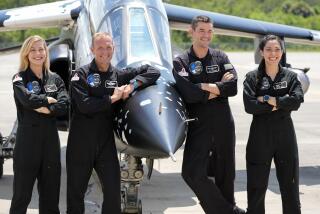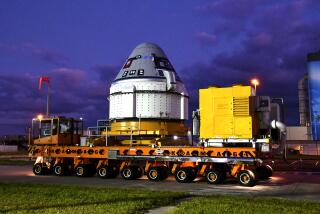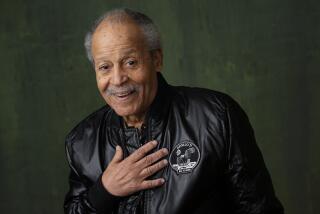Shuttle Readied for Secret Flight as Skies Clear : MELISSA HEALY
- Share via
KENNEDY SPACE CENTER, Fla. — Three days after foul weather and an astronaut’s cold delayed the launch of the space shuttle, the Florida skies cleared and so did astronaut John O. Creighton’s head, promising an early morning launch of Atlantis today.
By Saturday evening, National Aeronautics and Space Administration workers had pumped 500,000 gallons of fuel into Atlantis’ external tank to ready the shuttle for its rare night launching. Once in orbit on a secret mission, the shuttle is expected to put a photo-imaging spy satellite into orbit.
A crew of five military astronauts is manning the Atlantis, the 34th flight of a U.S. space shuttle and the sixth shuttle flight entirely dedicated to a Defense Department mission.
Creighton, a Navy captain, is commander of the flight. The other astronauts are Air Force Col. John H. Casper, the pilot, and mission specialists Marine Lt. Col. David C. Hilmers, Air Force Col. Richard M. Mullane and Navy Lt. Cmdr. Pierre J. Thuot.
Creighton’s scratchy throat and congestion delayed the shuttle liftoff twice--on Thursday and Friday mornings--even as gusty winds and thunderstorms threatened to cause postponements. By Friday, NASA flight surgeons had cleared Creighton for flight, but torrential rains swept across Florida and grounded the shuttle on its launch pad for a third day in a row.
N ot since the Apollo 13 mission of April, 1970, has an astronaut’s illness delayed a launch. NASA officials said Creighton’s illness was not “anywhere near significant enough” to prompt his replacement. But they added that the space agency no longer trains back-up crews and would have had to scramble to find a new commander for Atlantis had Creighton’s illness been more serious.
At Kennedy Space Center alone, each day’s delay costs $247,000 in labor and materials, NASA officials said.
While the Defense Department has shrouded Atlantis’ payload in secrecy, experts said that the shuttle is carrying a $500-million satellite called the KH-12 into space. The “keyhole” satellite would be the sixth in a constellation of U.S. craft designed to photograph and relay images of military and other installations, according to John Pike, a space expert with the Washington-based Federation of American Scientists.
More to Read
Sign up for Essential California
The most important California stories and recommendations in your inbox every morning.
You may occasionally receive promotional content from the Los Angeles Times.













